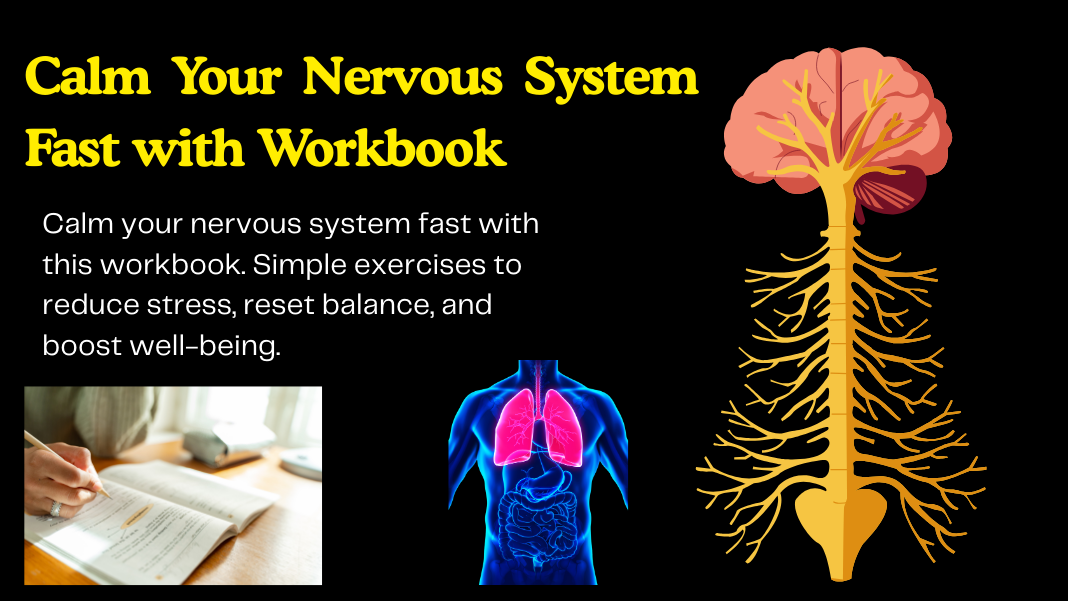In today’s modern world, more people than ever before are struggling with stress, anxiety, and exhaustion without realizing the long-term consequences on their nervous system. What was once considered “just stress” has now become a silent epidemic—affecting sleep, mood, immunity, and even heart health.
The nervous system is the command center of your body. When it becomes dysregulated due to constant pressure, digital overload, poor lifestyle choices, or unresolved emotions, the effects can be devastating. Doctors are seeing younger patients with issues like hypertension, migraines, chronic fatigue, and even autoimmune conditions that often link back to nervous system imbalance.
How the Modern Era is Affecting Your Nervous System
Unlike previous generations, we live in an environment that keeps us in a near-constant “fight or flight” state. Social media notifications, endless work demands, and lack of quality sleep overstimulate the brain. Over time, this overstimulation traps the nervous system in survival mode.
Research shows that chronic stress increases cortisol levels, damages brain pathways, and weakens the body’s ability to regulate itself. This explains why so many people today struggle with burnout, unexplained pain, or digestive disorders. The nervous system is not designed to stay in high alert mode for years—it eventually breaks down.
The Deadly Side of Ignoring Nervous System Health
Neglecting your nervous system health doesn’t just affect your mood—it can slowly erode your physical health. Prolonged dysregulation is connected to:
- Heart Disease – Stress hormones elevate blood pressure and damage arteries.
- Weakened Immunity – A constantly triggered nervous system makes you prone to infections.
- Mental Health Disorders – Anxiety, panic attacks, and depression often trace back to overstimulation of the nervous system.
- Sleep Disorders – Insomnia and irregular sleep cycles worsen because the body cannot switch off.
- Neurodegeneration – Studies suggest that chronic stress accelerates cognitive decline and memory loss.
These aren’t just minor problems; they are life-altering conditions. Left untreated, nervous system dysregulation can shorten lifespan.
Doctor Approaches to Treatment
Healthcare professionals recommend combining lifestyle changes with evidence-based practices for regulating the nervous system:
- Deep Breathing and Meditation – Calms the sympathetic system and lowers heart rate.
- Physical Movement – Exercise, yoga, and stretching help release trapped stress.
- Nutrition – Foods rich in magnesium, omega-3, and B-vitamins support nerve function.
- Therapeutic Support – Cognitive behavioral therapy (CBT) and somatic therapy address the root of emotional stress.
- Medical Support – In severe cases, doctors may prescribe medications to stabilize mood and sleep cycles.
These interventions aim to restore balance—helping the body return to its natural state of regulation.
Workbook as a Gentle Support Tool
While medical and therapeutic approaches form the backbone of treatment, a nervous system regulation workbook can serve as a practical, at-home guide. It provides simple exercises, reflection prompts, and calming techniques that individuals can use daily. For beginners, this offers structure without feeling overwhelming—like a small step toward a bigger healing journey.
Top 10 Habits to Strengthen and Heal Your Nervous System
Final Thoughts
The nervous system is more fragile than most people realize. In our hyper-connected world, protecting it is no longer optional—it’s essential. Stress, left unmanaged, is not just uncomfortable; it’s deadly over time. By adopting healthier habits, seeking medical support when needed, and using tools like workbooks for self-regulation, you can regain control and protect your long-term health.
Healing your nervous system isn’t a luxury—it’s survival in the modern era.
Calm Your Nervous System Fast with a Workbook: The Story of Jack
Nine-year-old Jack Miller had a problem—his nervous system went wild every time he had to speak in front of his class. His hands would shake, his voice would crack, and he’d forget every word he memorized.
One day, his teacher gave him something unusual: a small calm workbook. Inside were simple pages—draw a circle when you’re angry, write one happy word when you’re scared, trace slow lines when your heart races.
Jack thought it was silly. But the next time his anxiety hit, he opened the workbook and started tracing lines slowly, matching his breath to each stroke. To his surprise, his heartbeat slowed down. His body stopped trembling. Within minutes, his nervous system felt calm—like magic on paper.
From then on, Jack carried the workbook everywhere. Before tests, before soccer games, before bedtime. And every time, it worked. His friends began asking for their own copies, and soon the whole class had “calm workbooks” to reset their nervous systems fast.
Some adults didn’t believe it at first. But the kids knew—sometimes the quickest way to calm your nervous system isn’t complicated at all. It can be as simple as a pencil, a page, and a breath.
FAQ
1. Can a workbook really calm the nervous system fast?
Yes. Simple workbook activities like deep-breath tracing, drawing calming shapes, or writing short positive words help redirect focus, slow breathing, and activate the body’s relaxation response.
2. How does a workbook help kids regulate their emotions?
When children write, draw, or trace patterns, it gives their nervous system a safe outlet. This shifts attention away from fear or stress and signals the brain to relax.
3. Can adults use a calm workbook too?
Absolutely. The same exercises—slow line tracing, mindful writing, or gratitude journaling—can help adults reset their nervous system quickly, especially during moments of anxiety or overwhelm.

